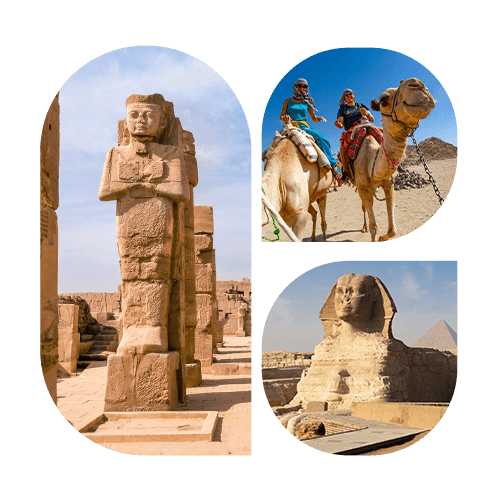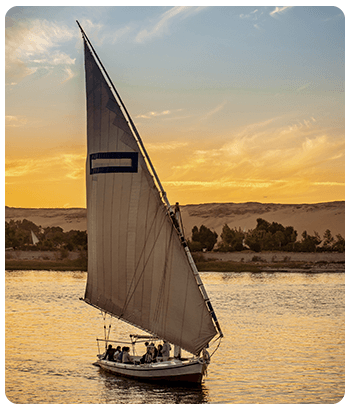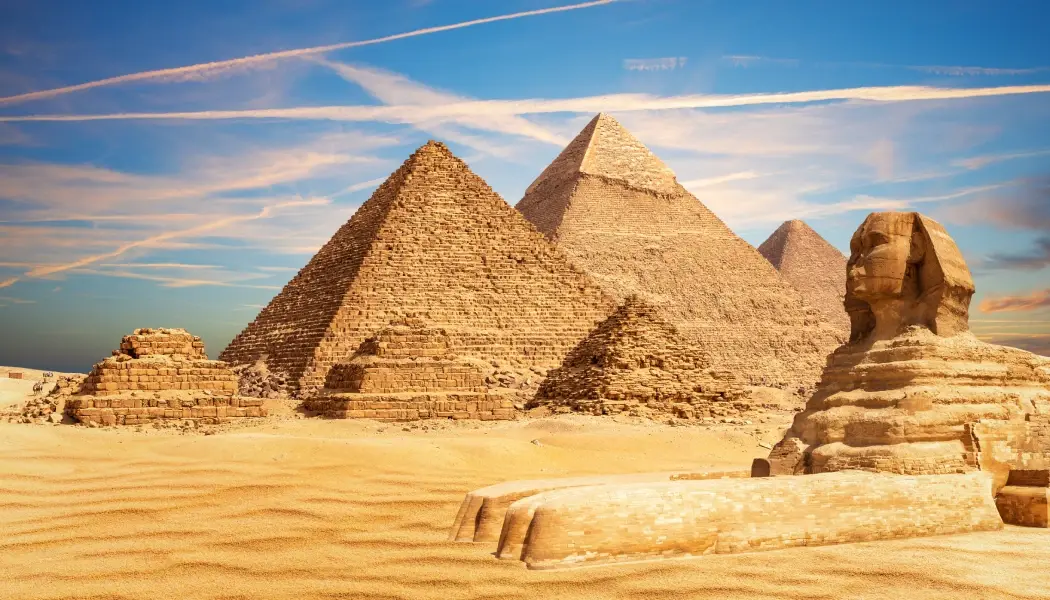

Egypt stands as the cradle of one of humanity's greatest civilizations, where ancient wonders meet vibrant modern culture. From the iconic pyramids and Sphinx to the bustling markets of Cairo and the serene waters of the Red Sea, Egypt offers an immersive journey through millennia of history while showcasing spectacular natural landscapes, warm hospitality, and a rich cultural tapestry.
Egypt represents one of the world's most significant historical destinations, drawing millions of visitors annually to experience its unparalleled concentration of ancient monuments and archaeological treasures spanning over 5,000 years of civilization.
The country boasts an extraordinary archaeological heritage with the Pyramids of Giza, Valley of the Kings, Abu Simbel temples, and countless other monuments, while institutions like the Grand Egyptian Museum showcase priceless artifacts from ancient times.
Egyptian cuisine delights with flavorful specialties like koshari, ful medames, and ta'ameya, complemented by fresh seafood along the coasts, while traditional ahwas (coffeehouses) provide authentic social gathering spaces for mint tea and shisha.
Cairo's legendary Khan el-Khalili bazaar offers a sensory journey through spice-scented alleys filled with handicrafts, papyrus, alabaster, carpets, and gold jewelry, while modern malls in Cairo and Alexandria provide contemporary shopping experiences.
Cultural performances include mesmerizing Sufi whirling dervish shows and traditional folk music, while Nile dinner cruises feature belly dancing and tanoura performances against the backdrop of Cairo's illuminated skyline.
The Red Sea coast offers world-class resort experiences with pristine beaches and renowned spa facilities, while traditional hammams provide authentic bathing rituals that connect to ancient Egyptian wellness practices.
Beyond historical exploration, Egypt offers thrilling desert safaris through majestic dunes, world-class diving among vibrant coral reefs in the Red Sea, and unforgettable hot air balloon rides over ancient monuments at dawn.
Modern airports in Cairo, Luxor, and Sharm El-Sheikh connect to international destinations, while domestic flights, trains, and Nile cruises facilitate travel between major attractions throughout this geographically diverse country.

Where timeless monuments stand as testament to humanity's greatest achievements,Where the life-giving Nile flows through landscapes of extraordinary beauty and history,Where ancient mysteries and warm hospitality create journeys of wonder and discovery .
Things to Do
Explore the Pyramids and Sphinx at Giza, cruise the Nile from Luxor to Aswan, visit the Valley of the Kings, snorkel in the Red Sea, and experience local culture in Cairo's historic neighborhoods.
Apply for an e-visa online before arrival, check security advisories for current conditions, and consider scheduling visits for early morning to avoid both crowds and midday heat.
Bring lightweight, modest clothing that covers shoulders and knees for visiting religious sites, comfortable walking shoes, sunscreen, hat, and a reusable water bottle for Egypt's hot climate.
Negotiate taxi fares before riding, carry small denominations for tips (baksheesh), and consider hiring certified guides at major archaeological sites for enhanced understanding and navigation.
The Egyptian pound (EGP) is the local currency, with ATMs widely available in tourist areas; while credit cards are accepted at larger establishments, smaller vendors and markets require cash.
Use ride-hailing apps in major cities for reliable transportation, consider domestic flights for longer distances, and book official transportation through hotels or reputable companies for intercity travel.
Dress modestly, particularly at religious sites; ask permission before photographing locals; understand that Ramadan observances may affect business hours; and respect conservative attitudes regarding public displays of affection.
Enjoy street food from busy, hygienic vendors, drink only bottled water, sample local specialties like koshari and ful medames, and expect dinner service to begin later in the evening than in Western countries.
Carry travel insurance with evacuation coverage, use bottled water for drinking and brushing teeth, protect against heat and sun exposure, and maintain awareness of surroundings particularly in crowded tourist areas.
Arabic is the official language, though English is widely spoken in tourist areas; learning basic Arabic greetings and phrases will be appreciated by locals and enhance your cultural experience.
Luxury five-star hotels along the Nile or Red Sea range from $150-400 per night, mid-range options average $50-150, while budget accommodations and hostels are available from $15-50 depending on location.
Archaeological site entrance fees range from $5-20 per site, Nile cruises average $100-300 per day all-inclusive, and guided tours typically cost $30-100 depending on duration and exclusivity.
Haggling is expected in markets with initial prices often marked up significantly; take time to compare quality and prices between shops, and be prepared to walk away to get the best deals.
History enthusiasts should prioritize Luxor and Aswan, beach and diving lovers will prefer the Red Sea coast, while those seeking cultural immersion should explore Cairo's historic districts and local markets.

Where ancient wonders rise from golden sands under the watchful gaze of the Sphinx,Where the life-giving Nile creates a verdant ribbon through the desert's embrace,Where coral gardens beneath turquoise waters reveal another dimension of natural splendor.


